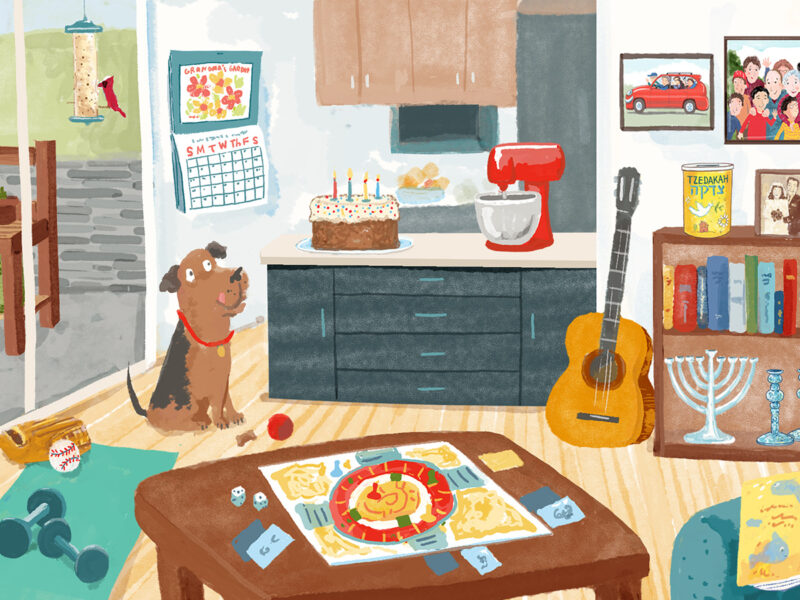The Robison Jewish Health Center is its official name, but almost everybody still calls it “The Home.”They probably don’t mean “home, sweet home,” but rather “the old folks’ home.” Though highly regarded by health care professionals, grateful families and dedicated donors, very few people are likely to say, “Goody! I get to go to The Home!”
When it was built in 1954 and expanded in the ’60s, Robison epitomized state-of-the-art design in efficient, effective elder care. Called a hospital-style model, it has long hallways with rooms off both sides, making it easy for staff to answer calls for assistance and to deliver food and medications. Most of the rooms are double occupancy, which lowers the cost. Many of our frail, sick or elderly Jewish family members invariably moved in and lived out their days. That’s what my in-laws and grandmothers did. That’s what “The Home” was for.
Cedar Sinai Park, Robison’s parent organization, is taking giant steps to completely turn that around.
“People tend to look at it as a destiny or a destination,” says Cedar Sinai Park CEO David Fuks. “What it needs to be is a resource.”
Dignity by Design
Dignity by Design is a major capital campaign that will not only finance a new facility and an overhaul of Robison, but will also continue the process already in place to reconfigure the services available through Cedar Sinai Park.
The new complex, to be called The Harold Schnitzer Rehabilitation and Care Center, will honor the wishes and needs of the community as well as align with new care modalities that have been shown to be more effective than the traditional hospital model. There is still a lot of money to be raised, but the campaign has already begun, with some major donors in place and significant community funds already in place. (See box for details.)
CSP volunteers and staff have already been meeting with members of the community one-on-one and in small groups to explain the new facility, listen to the interests and concerns people have, and find ways people can help secure a future of love, honor and respect for our elders. The Harold and Arlene Schnitzer Family Fund of the OJCF has pledged $5 million. For many others, a generous gift is much more modest but still reflects their own heart-felt commitment and plays a critical role in the success of the campaign. Many financial gifts even come with opportunities to name a room, a garden or another spot on the campus.
Donors Step Up
Beverly Eastern says that Cedar Sinai Park has been a part of her family for more than 40 years. Her husband, Stan, was the treasurer for several years. Her aunt once lived at Robison, and her mother was at Rose Schnitzer Manor. Both Bev and Stan have served as board presidents.
“Our daughters practically grew up there,” Bev remembers. They played on the floor and attended Passover seders there to be with family. Today their daughter Michelle is on the board and is especially active in Sisterhood.
“We have always supported The Home,” Bev says. “This is our priority.” Bev and Stan have donated to the campaign and will have a Robison residential room named in their honor.
Nathan Cogan’s family connection to CSP goes back two generations: his aunt and uncle and later his in-laws lived there. When his wife, Sara Glasgow Cogan (z’l), was board president, the family created The Sara Cogan Building Fund to support The Home over time. “We had raised three sons, all married and doing well, so we figured why not donate a percentage of our estate to charity. We had no clue then what would happen down the road,” Nathan says.
Nine months later, Sara was tragically killed by a car during her term as president. Nathan decided to make a substantial pledge to ensure her memory would still be alive in the activities at CSP. To his joy and delight, his brothers-in-law matched his pledge. Then close friends, Gary and Judy Kahn, and later Larry and Linda Veltman contributed. Now, the sanctuary at Robison will be named The Sara Glasgow Cogan Chapel.
As of Sept. 1, 340 donors have together contributed or pledged $13.5 million toward the project. That leaves $6.3 million remaining to be raised from community donations. Fuks expects half of that will come from foundations.
The Harold Schnitzer Rehabilitation and Care Center
The “new CSP” will provide the same range of services, including rehabilitation and short-term care, long-term nursing care and care for dementia residents. There will be an increased emphasis on a greater mix of rehab options as well as expanded use of case management to help people make a stable transition back home. The patient-centered care model that CSP has been adopting over the past few years will be enhanced dramatically in the households in the new buildings as well as in the more homelike, refurbished Robison rooms.
The two new buildings will consist of four 12-bedroom households. One three-household tower will be on the Beaverton-Hillsdale side of the property; the other will be adjacent to Southwest 62nd Street. Both will be attached to Robison to form one unified structure. Each household will have its own living room and kitchen and will be decorated to feel like a home, complete with a fireplace and a sitting area. Every bedroom will be a private room with its own bathroom, with a big window and a couch that converts to a guest bed.
Robison itself will be extensively renovated. While the hallways will remain, Robison rooms will be homey and inviting single rooms with private bathrooms. The common areas will be upgraded to be more comfortable for residents and guests alike. There will be gardens to explore, with alcoves for relaxing and visiting. The campaign goal also includes an endowment fund for building maintenance.
“Environment has an impact on how we feel,” Fuks explains. “One of the things we know about the household model is that even when people are very fragile, they are more socially engaged and their cognition functions at a higher level because of the kind of ‘cueing’ in a household, a place we’re all used to. They aren’t exempt from illness, but people feel better.”
It will also be a better place to visit, he adds, and when people visit their loved ones, everybody wins. Of course the resident enjoys the company, but it’s more than that.
“It’s much nicer to enter a place that feels like a house rather than an institution. They can go to ‘grandma’s house.’ They can bake cookies in the kitchen, sit in the living room and visit with grandma and her neighbors.”
But I want to stay home!
Community surveys and conversations with seniors and baby boomers alike have shown quite clearly that people today want to stay in their own homes as long as possible. Period. That home may be the house where they raised their kids, but it may also be a smaller apartment or condominium in a general or senior community setting.
CSP built the Rose Schnitzer Manor back in 1998 to accommodate some of these downsizers. Kehillah Housing, which opened last year, provides independent living apartments for adults with disabilities. CSP has provided affordable housing at the Rose Schnitzer Tower in downtown Portland since 2007.In the past two years, CSP acquired three more affordable housing buildings in downtown Portland to extend its high-quality housing experience to those seniors and adults with disabilities who are on a more limited income.
It is not out of the realm of possibility that CSP will explore other housing options in the future.
If I fall or get sick, does that mean I have to give up my home?
Quality rehabilitation care is a key to recovering from, say, a stroke or a fall. The new facility will have additional rehabilitation services as well as enhanced nursing care. It will expand the number of rooms available to short-term rehabilitation patients, and all bedrooms will be dual certified for rehabilitation and nursing care.
But what if I need help to stay at home?
Becoming a resource that enables people to stay at home as long as possible as well as the best place they can go to get the care they need. It created Adult Day Services in 1999 to provide elders with a quality daycare experience and to offer their caregivers much-needed respite. Sinai Family Home Services, a 2007 partnership between CSP and Jewish Family & Child Service, serves “elders and people with disabilities who want to remain in their own homes while receiving the care and companionship they may need,” according to its website. Other services are on the drawing board. CSP and other community organizations are working together to enhance the lives of our elders, wherever they choose to call home.
“The goal is to give people excellent rehabilitation so they can get home fast; resources in the community so they can stay home; and a nursing facility, should they need it, in a place that seems like home, reflective of the way they like to live, the community they want and the dignity they deserve,” says Fuks, CEO.
Important Dates
6/15/15—- Fundraising to be completed
7/15/15—- Ground-breaking!
7/16 ——- New buildings ready for residents
1/17 ——- “New” Robison ready for residents
Liz Rabiner Lippoff is a medical marketing consultant and freelance writer. She and her husband David have donated to the capital campaign. LizInk.biz
On Southwest Boundary Street in Portland:

Robison Jewish Health Center
Rose Schnitzer Manor (assisted living)
Adult Day Services 30 Robison Residence (residential care)
Kehillah Housing (adults with disabilities) 25 The Cedar Sinai Park Foundation 20
Downtown Portland:
15 Rose Schnitzer Tower (affordable housing)
The 1200 Building (affordable housing) 10 The Park and Lexington Buildings (affordable housing)
Fundraising goal $19.35 million Capital sources* $10.5 million Overall goal $29.85 million Funds raised to date
$13.5 million**
* Bond financing ($7.5 million); low-income housing develop- ment proceeds ($1.5 million); capital replacement funds ($1 million); board designated funds ($0.5 million).
Housing with Services, LLC (provides services for those in CSP affordable housing)




